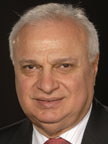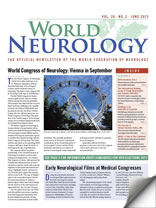 The WFN has been part of my life for 32 years. It all started when I presented a paper at the 1981 World Congress in Kyoto. I soon realized that neurology is an international fraternity of like-minded people who strive to understand and advise each other. This was made more poignant as I was already an émigré from my own country of birth, Iraq. After finishing my undergraduate medical degree at Baghdad University, I headed to the U.K. to train in neurology. Thereafter I could not go back to Iraq because of war. Neurology came to my aid, and I went to work in neighboring Kuwait. At that time, a new medical school was being established, and I ended up as academic vice dean. After another war in the region, my family and I had to leave with few possessions. After a period of being jobless and stateless, we were fortunate to be able to come back to the U.K. This was only possible because of the WFN and my friends and colleagues. I am greatly indebted to Lord Walton, then-president of the WFN, for his support and that of many WFN colleagues from across the world who enabled me to re-establish my career as a neurologist.1
The WFN has been part of my life for 32 years. It all started when I presented a paper at the 1981 World Congress in Kyoto. I soon realized that neurology is an international fraternity of like-minded people who strive to understand and advise each other. This was made more poignant as I was already an émigré from my own country of birth, Iraq. After finishing my undergraduate medical degree at Baghdad University, I headed to the U.K. to train in neurology. Thereafter I could not go back to Iraq because of war. Neurology came to my aid, and I went to work in neighboring Kuwait. At that time, a new medical school was being established, and I ended up as academic vice dean. After another war in the region, my family and I had to leave with few possessions. After a period of being jobless and stateless, we were fortunate to be able to come back to the U.K. This was only possible because of the WFN and my friends and colleagues. I am greatly indebted to Lord Walton, then-president of the WFN, for his support and that of many WFN colleagues from across the world who enabled me to re-establish my career as a neurologist.1
I have been a WFN delegate since Hamburg 1985, a member of various committees (Education, Public Relations and Finance), and chair of a WFN Research Group (Tropical Neurology). I have been involved in the organization of four World Congresses (London, Bangkok, Marrakesh and Vienna). As secretary-treasurer general since January 2007, I was subsequently re-elected for a second and final term. I can say with confidence that I probably know the WFN intimately. At least I thought I did until I asked a close neurology friend for advice on whether I should run for president. The answer made me think hard and search deeply for a reply. The two questions posed were: Why is there a WFN, and can you really make a difference? They made me think hard, searching for a reply.
Why Is There a WFN? Does It Matter?
As we all know, international bodies have their admirers, beneficiaries and critics. I dare say the latter group is not insubstantial. To state the obvious, the WFN is a forum for all to see what is happening in their region and across the world. Neurologists meet, interact and go home after meetings, having made friends and learned from others. They also present their experiences in neurological practice and research and create new ideas and relationships.
The WFN is necessary as a conduit for channeling activities whether scientific, clinical or therapeutic, as well as social interactions with like-minded individuals. Although one hears from various colleagues across the world about the overall value and usefulness of the WFN, when it comes to world congresses, there can be no doubt that every neurologist from all corners of the globe will endeavor to attend and present his or her work. Many from the more developed parts of the world feel privileged to be asked to speak in scientific sessions and teaching courses to impart their experiences to colleagues who may not have the same access to technological advances.
The WFN matters because it brings together national, regional and international organizations in an egalitarian and friendly manner. At the WCN, all participants feel they are part of a global umbrella organization, and this is what gives the meetings their importance and uniqueness, as this may not happen in national or regional meetings. During my tenure as WFN secretary-treasurer general, and coming from my background, I have always tried to make sure that the whole world is represented and actively interacting.
The role of the WFN as a representative of neurology in international forums is crucial. The WHO recently recognized neurology as a speciality, and it is now part of the section of mental health and noncommunicable diseases. This culminated, in 2009, in the formation of the Topic Advisory Group (TAG) on neurosciences to review ICD 10 and come up with ICD 11 in 2015. I am privileged to chair this group, which includes neurology and neurosurgery. With the help of many colleagues from across the world, this project is going well.
The WFN has donated a substantial grant to the project, and we have already made important changes in the way neurology is categorized in the WHO. As everyone knows, Ministries of Health report health statistics to the WHO. Stroke, the most devastating and common neurological condition, was classified under cardiovascular disease. With the efforts of many in the TAG, especially the World Stroke Organization, and with full agreement of our cardiology colleagues, the WHO has agreed to move stroke to neurology in ICD11.
All these activities would not have been possible without the WFN. So to answer the first question, yes the WFN does matter.
Can I Really Make a Difference?
This is a more difficult question. I just have to look at the list of former WFN presidents to be humbled by the talent and achievements of each and every one of them. Can I do something different? After alot of soul searching, I have decided that I can. My plan I think is simple. Global involvement through regional empowerment.
It has been my role to work with my trustee colleagues to try to involve as many neurologists as we can in various activities. We have sometimes succeeded, and at other times have not. If every neurological society is to have its say, the WFN must have the mechanisms to listen and fulfill as many of those wishes and requests as possible. Regional organizations are there to bridge the gap. They are at various stages of evolution, some are mature and very much involved, while others may not be at that level but are still trying their best to move ahead and may request WFN advice and guidance. One has to say that as much as the WFN thinks it represents the views of member societies, they are the ones who really know better and should be listened to.
If elected, it will be my goal to introduce a mechanism of organized devolution, both administrative and financial, from the center to the regions and individual societies in order to ensure benefits for all. This needs to be made more tangible, so that all stakeholders feel they are a real part of the process. The WFN should foster and encourage the burgeoning expansion of neurology in developing countries, while at the same time maintaining interest from the developed countries in all WFN activities. This will be done by enhancing educational programs, grants, symposia, CME, traveling fellowships, accreditation and postgraduate training programs. All of these activities can only be accomplished with a sound financial foundation. I feel that as secretary-treasurer, I have proved that the WFN is a financial success and will continue to be so in the future.
International organizations need dedicated and hard-working individuals who can give their time and commit themselves to the greater good. The vision comes from many people, but it is then vital to listen, assimilate and discuss if we are to come up with cohesive solutions to issues, which however problematic, are solvable.
The WFN is an organization run by six elected trustees. They are answerable to the highest authority in the organization, the Council of Delegates. If elected as president, I will adhere strictly to this principle and decisions will be made only by consensus of the trustees with full participation of regional directors who know their regions better than anyone else.
So, to answer the second question, yes, I can make a difference.
With your help, I sincerely hope we can achieve these goals.
Footnote
-
President’s column, World Neurology 1991, Vol 6, Number 2.
